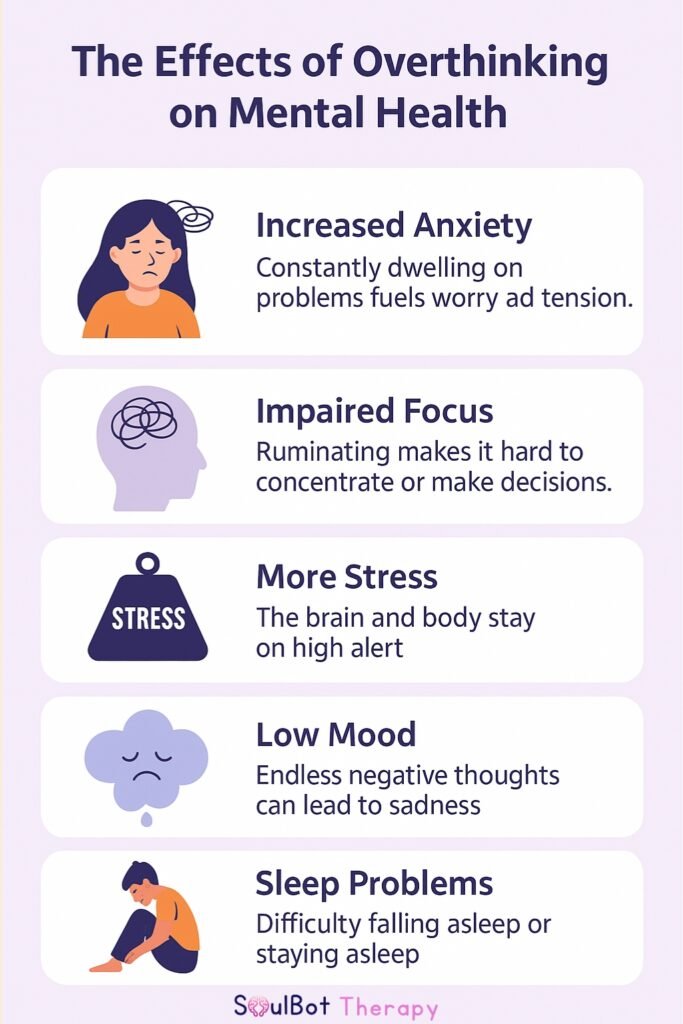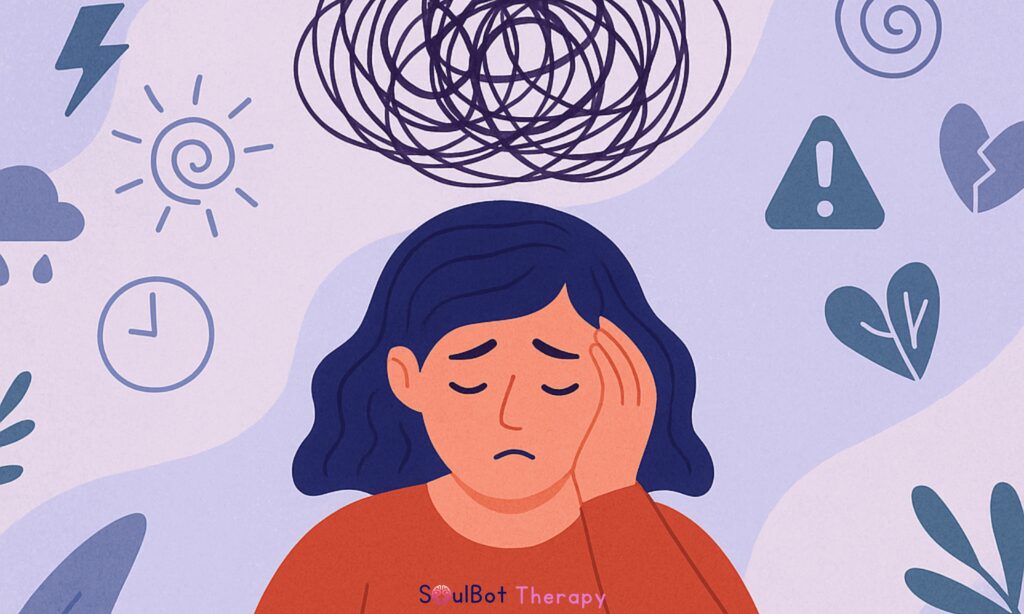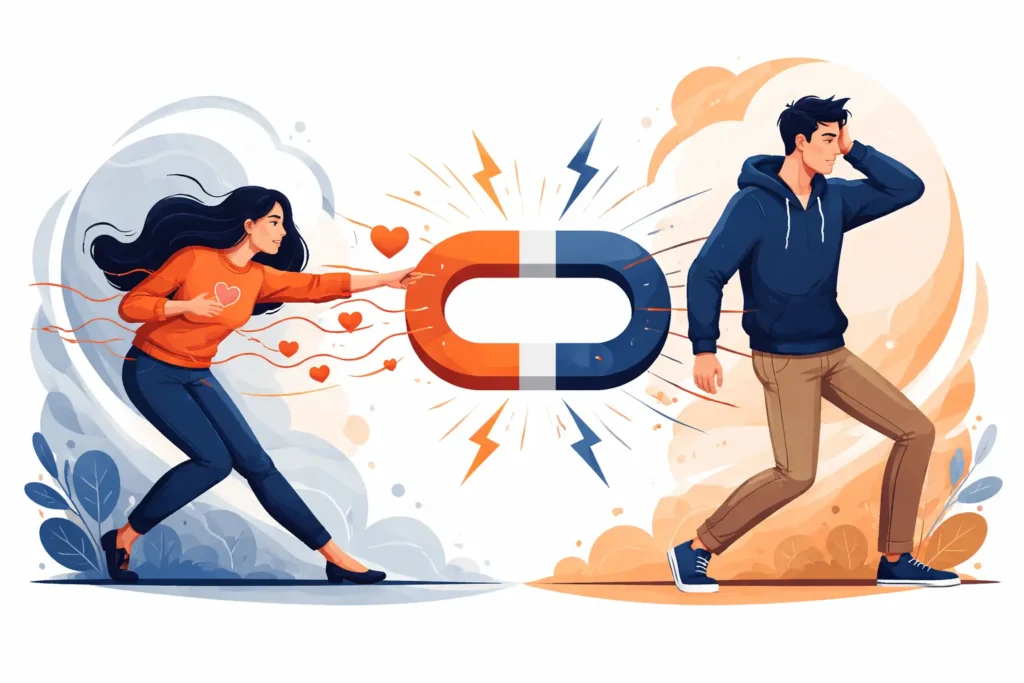Why do I overthink everything, even the most minor things?
From replying to a simple message… To replay a conversation from three days ago… To imagine every worst-case scenario before saying yes to a plan…
Sound familiar?
If your brain feels like it has 47 tabs open and 3 of them are frozen, you’re not broken you’re overprocessing.
Let’s dive into the psychology of overthinking, how it links to anxiety, and how tools like AI therapy can help you finally let go.
📊 The Data Doesn’t Lie:
A study from the University of Michigan found that 73% of adults aged 25–35 experience frequent overthinking, especially women, often leading to anxiety, insomnia, and decision paralysis.
Why Do I Overthink? A Psychological Explanation
Overthinking is often driven by:
🧠 When your brain detects uncertainty or emotional risk, it tries to “solve” the discomfort through:
- Rumination: Replaying scenarios, trying to perfect outcomes
- Catastrophizing: Imagining worst-case results to “prepare” emotionally
- Control-seeking: Trying to pre-plan all outcomes to feel safe
But instead of clarity, we get mental clutter, regret, and emotional fatigue.

The Effects of Overthinking on Mental Health
Overthinking doesn’t just feel exhausting; it physically and cognitively wears you down.
🧠 Cognitive effects:
- Decision paralysis
- Mental fog
- Memory disruption
😴 Physical & emotional effects:
- Insomnia
- Muscle tension
- Emotional numbness
These are the real effects of overthinking, and they reinforce a cycle of avoidance and shame.
What is The Link Between Overthinking and Anxiety?
Overthinking and anxiety are emotional twins; one fuels the other.
When you’re anxious:
- You overthink to try to control what feels out of control
- You avoid action because it feels “risky.”
- You seek certainty in uncertain places (texts, reactions, outcomes)
But certainty rarely comes, and the more you chase it, the more anxious you become.
This loop is what AI therapists like SoulBot help disrupt by offering calming responses, emotional clarity tools, and reflective prompts.
Learn how overthinking affects the brain and behaviour
Signs You Might Be Trapped in an Overthinking Spiral
Do any of these feel familiar?
- You retype texts 3–5 times before sending
- You analyze the tone in someone’s message
- You avoid making choices in case they’re “wrong”
- You mentally relive arguments long after they’re over
These are typical behaviors of someone trapped in a rumination loop, often without realizing it.
How to Stop Overthinking: Science-Backed Tools?
You can’t “think your way out” of overthinking; you have to shift your relationship to thought.
1. Time-Block Your Thinking
Give yourself 15 minutes daily to reflect. After that, release it. Set a timer and stick to it.
2. Name the Thought, Not the Story
“I’m telling myself they’re mad” is different from “They’re mad at me.”
3. Journal Once, Don’t Re-Loop
Write the worry. Set it down. Walk away.
💡 Use SoulBot’s AI Counselling journal to offload mentally when stuck in loops.
4. Interrupt Physically, Not Mentally
Move. Walk. Shake your hands out.
Break the mental loop with a body-based cue.
How Can AI Mental Health Support Help Break the Cycle?
Sometimes we overthink because we don’t feel safe being wrong, messy, or uncertain.
That’s where AI therapy can help.
✅ SoulBot – Your Mental Health Companion can:
- Detect emotional spirals based on journaling
- Offer neutral reflection prompts (“Is this helpful or hurtful thinking?”)
- Provide affirmations and anxiety grounding techniques
- Track patterns so you see your overthinking loop over time
It’s like having an always-available, judgment-free emotional clarity coach.
You Don’t Need to “Think Less,” You Need to Feel Safe Enough to Let Go
Overthinking isn’t proof you’re thoughtful, it’s proof you’re overwhelmed. But peace doesn’t come from solving every outcome.
It comes from trusting that you’ll handle what comes when it comes.
👉 Take the Anxiety Self-Check (Coming Soon)
👉 Talk to SoulBot your 24/7 AI Mental Health Coach, when your brain won’t stop looping
🔗 Related SoulBot Reads








